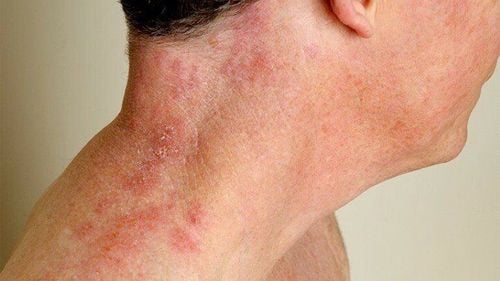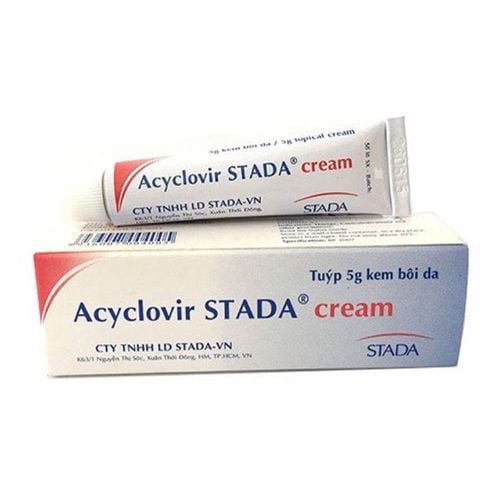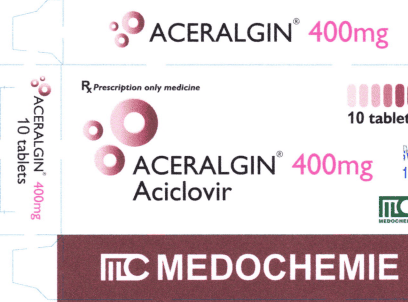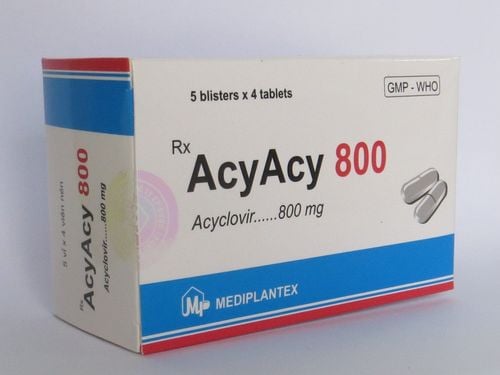This is an automatically translated article.
It is very rare to get chickenpox again because after contracting the disease, the body has built its own immunity to the disease. However, the virus that causes the disease will go deep into the nerve roots and stay there, once the human immune system is weakened, the virus will reactivate and cause shingles.
1. Causes of chickenpox
Chickenpox is an infectious disease caused by the Varicella Zoster virus (VZV). The initial manifestations of the disease are blisters on the skin and mucous membranes, high fever, weakness, and fatigue. The disease is highly contagious, spreading directly from person to person.
Chickenpox is mainly transmitted through the respiratory tract, so all cases are caused by contact with someone who has chickenpox when breathing in saliva when a person with chickenpox coughs, sneezes, or comes in direct and indirect contact with chickenpox. contact with the fluid inside the blister. Sharing personal items is also one of the causes of disease transmission.
2. Can I have had chickenpox before?
So if you have been infected with the virus once, will chickenpox come back? Accordingly, it is very rare to have chickenpox again, because after contracting the disease, the body has built its own immunity to the disease. However, the virus that causes the disease will go deep into the nerve roots and stay there, once the human immune system is weakened, the virus will reactivate and cause shingles.
Besides, children with chickenpox under 6 months old or people who have chickenpox for the first time are mild, antibodies generated after the first infection are not enough to destroy the attack of chickenpox virus in the next time. . Although the chance of getting chickenpox again accounts for 10-20%, compared to the first time, the next time will be milder and faster, the symptoms are not as severe as the first time.
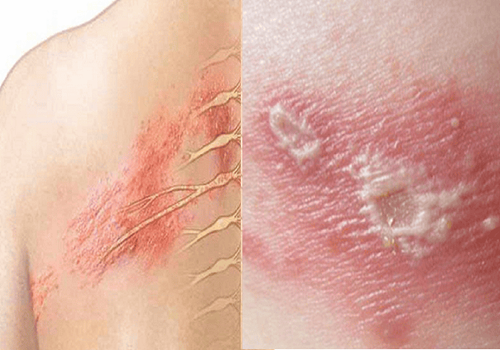
Bệnh zona có thể xuất hiện đối với bệnh nhân thủy đậu từ virus gây bệnh thủy đậu
3. Chickenpox complications
Although it is a benign disease, chickenpox can still cause many dangerous complications, even life-threatening if not treated properly and promptly. Some common complications of chickenpox include:
Shingles : After healing, the chickenpox virus remains in the nerve roots. When the nervous system is weakened, the virus reactivates and causes shingles. Chickenpox complications during pregnancy (perinatal chickenpox): Pregnant women with chickenpox will cause many dangerous effects to the fetus such as: The fetus is infected with chickenpox from the mother, causing disability and death. Infection, secondary superinfection: This complication is caused by internal hemorrhagic vesicles when the blisters are broken, scratched, and peeled, leading to infection, pus formation, and sores. Due to infection, when cured, it will leave deep scars that are difficult to treat. Encephalitis, meningitis: This complication appears in both adults and children, appearing 1 week after bubbling water. Complications can be fatal for the patient if not treated promptly.

Viêm màng não là một biến chứng nguy hiểm của bệnh thủy đậu
Landry's palsy syndrome: is a rare disease involving the peripheral nervous system, causing weakness in the extremities, gradually paralysis and then spreading to the whole body. Laryngitis: Caused by chickenpox blisters growing in the oral cavity or oral mucosa, causing infection and swelling. Retinitis: VZV virus enters the cornea and will damage the eye, even leading to retinitis. Chickenpox pneumonia: Usually occurs in adults, on the 3rd - 5th day of the disease with manifestations such as coughing, coughing up blood, chest pain, shortness of breath. Acute glomerulonephritis: If severe chickenpox affects the kidneys, causing nephritis, acute glomerulonephritis. Hepatitis: Rare and usually will have no obvious symptoms. Some symptoms may appear in patients such as indigestion, nausea, and weakened immunity. Otitis externa, middle ear: People with chickenpox can develop complications of otitis in the case of blisters growing in the ear causing ulcers, sores and itching. Reye's syndrome: People who get chickenpox during treatment with aspirin will have Reye's syndrome - a disease related to the brain and fatty degeneration of the liver. Common symptoms of this complication include coma, jaundice, cerebral edema, convulsions, bleeding....
4. Treatment and prevention of chickenpox recurrence
4.1. Chickenpox treatment
Chickenpox currently has no specific treatment, however, patients can self-treat at home according to the instructions and instructions of the doctor. In case of signs of infection in the blisters, they should be treated in the hospital. How to treat chickenpox quickly, without scarring, patients need to combine home care and drug treatment as follows:
Home care:
Limit contact with many people and avoid going to areas public. Should choose loose, light and thin clothes, good sweat absorption to avoid breaking the blisters. Avoid going to the wind because at this time the body is very susceptible to cold, making the disease worse. Use personal belongings (towels, glasses, cups, spoons, chopsticks) separately; rest in a cool, clean place, isolated from uninfected people (isolation for 7-10 days from the date of rash); keep body hygiene, cut nails and keep hands clean (for young children, parents should use cloth gloves for babies to avoid hurting the chickenpox blisters). Do not scratch to avoid breaking the blisters and pus draining into the surrounding healthy skin. If the patient has abnormal symptoms such as prolonged high fever, convulsions, coma, bleeding, they should immediately go to the hospital for monitoring and treatment.
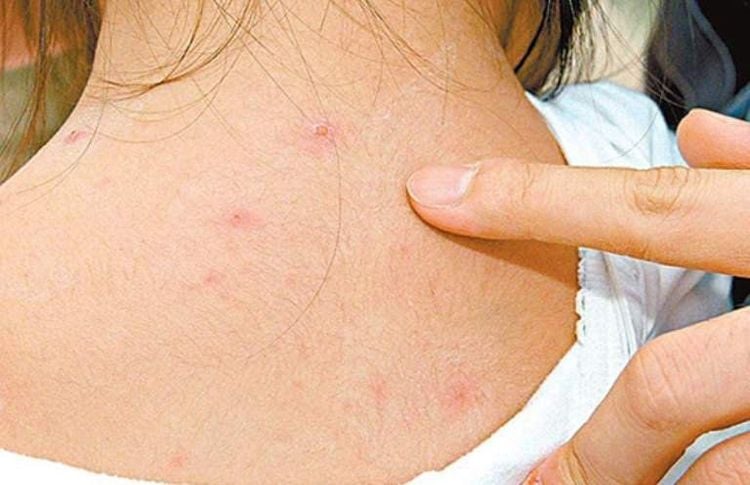
Khi bị mắc thủy đậu, người bệnh không được gãi gây vỡ mụn nước
Treatment with drugs:
For red spots on the body, you can use a solution of potassium permanganate applied to acne spots to fight inflammation and prevent scarring later. If blisters break, apply methylene blue solution. Absolutely do not use Tetraxiclin grease, Penixilin grease, red medicine. When the acne is scaly, the patient can use allergy creams, topical medicines for itching (children under 6 months of age and pregnant women should not use anti-itch creams containing Phenol). Eye drops 2-3 times a day with 0.4% Chloramphenicol or 1% Acgyrol solution to disinfect eyes and nose. If you have a high fever, you can use ordinary fever-reducing drugs, but you need to follow your doctor's prescription (do not use Aspirin or products containing Aspirin to reduce fever).
4.2. Prevention of chickenpox recurrence
To prevent chickenpox recurrence, People need to take some measures:
Limit exposure to the risk of pathogens. Improve health, strengthen the body's resistance with a healthy and balanced diet, living activities, eating enough nutrients combined with regular exercise. Get the chickenpox vaccine. This is an effective way to prevent disease for children or adults who have never had chickenpox. After vaccination, the body will make antibodies to help fight the chickenpox virus, similarly, people who get chickenpox for the first time also have antibodies for immunity afterwards. Daily personal hygiene should be maintained, and the general hygiene of the living and working environment around should be maintained. If you suspect that you have chickenpox, you should be aware of self-isolation and take care of yourself to protect others.

Tiêm vắc-xin thủy đậu giúp phòng ngừa tái phát bệnh thủy đậu
Vinmec International General Hospital provides varicella vaccination service for all customers, customers using the vaccination service at Vinmec will have advantages such as:
Source high quality vaccines, with clear origin, suitable for the age to be vaccinated. Ensure safety from the stage of registration, storage to use. Before vaccination, all customers are screened before vaccination with specialist doctors to ensure the best health when vaccinated. 100% of vaccinated customers are monitored and re-evaluated before leaving. In particular, the post-vaccination monitoring room is fully equipped with emergency facilities; the team of doctors - nurses are trained in anaphylaxis emergency management to ensure timely and correct treatment when an incident occurs. For direct consultation or to schedule an appointment for vaccination at Vinmec International General Hospital, you can contact Vinmec Health System nationwide, or register online HERE




